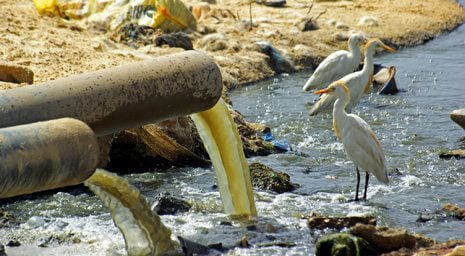Water pollution is a rapidly growing global issue. Global waters are gaining acidity and toxicity through the massive amounts of power and resources to run large businesses. This leads to a massive amount of waste products. Water pollution has a huge negative impact on the entire biosphere. The fossil fuel, food, chemical, and pharmaceutical industries are major culprits. Almost all factories run on fossil fuels which release huge amount of chemicals into the air. It all starts with the companies that use fossil fuels that use fossil fuels to power the entire process of extracting fossil fuel to create energy in the process of respiration. The chemical industry creates thousands upon thousands of unique chemicals, through refining of fossil fuel, and other natural resources. Through synthetic chemical reactions that are needed to produce the chemical the company needs, byproducts that tend to be toxic to organisms are formed. Some harmful waste products of these industries are heavy metals like aluminum, mercury, arsenic,and lead which are released into the surrounding environment through factory run-off, accidental spillage, and nanoparticles. This increases the pH (or the toxicity) of the water. When fossil fuels undergo combustion to release the energy for human use, sulfur dioxide and nitrogen oxides are released into the atmosphere and rise up into the clouds. They mix with water and created acidic solution, this is called acid rain. The increase in amount of acid rain is very slowly decreasing the pH of global water. The problem with this is that most cells in most organisms on earth function at an optimal neutral pH of 7. The decrease in pH slows down metabolic activities, which is not good for a organism.

Legislative action: One of the biggest problems with water pollution is its transboundary nature. Pollution discharged by factories in one country with poor environmental standards can cause problems in neighboring nations, even when they have tougher laws and higher standards. Environmental laws can make it tougher for people to pollute, but to be really effective they have to operate across national and international borders.
Economics: Life is ultimately about choices—and so is pollution. We can live with sewage-strewn beaches, dead rivers, and fish that are too poisonous to eat, or the world’s government can collaborate and use proper we can work together to keep the environment clean so the plants, animals, and people who depend on it remain healthy. We can take individual action to help reduce water pollution, for example, by using environmentally friendly detergents, not pouring oil down drains, reducing pesticides, and so on. We can take community action too, by helping out on beach cleans or litter picks to keep our rivers and seas that little bit cleaner.
Inevestment in alternative resources: Burning fossil fuels including the gasoline that is used as a gas for most cars leads to increased water pollution, however by using alternative renewable resources it is possible to cut down on the amount of fossil fuels burned. Instead of using a conventional power plant to power your home invest in solar energy technology. By doing so you are also supporting the companies developing this technology which could hopefully lead to an advance in future renewable resources and will over time decrease the cost of these now expensive investments.
